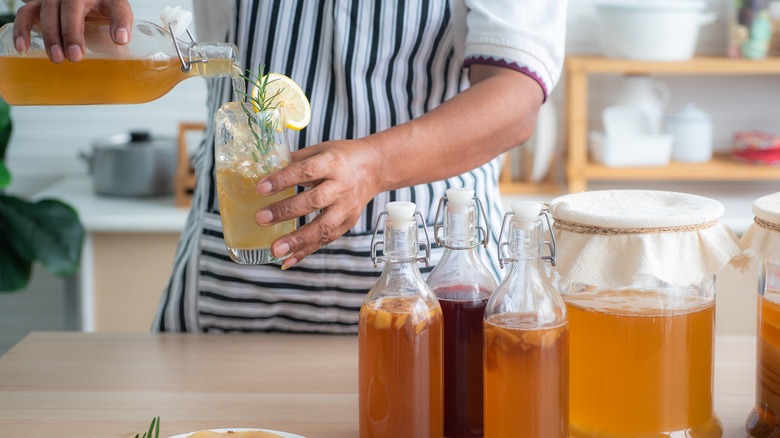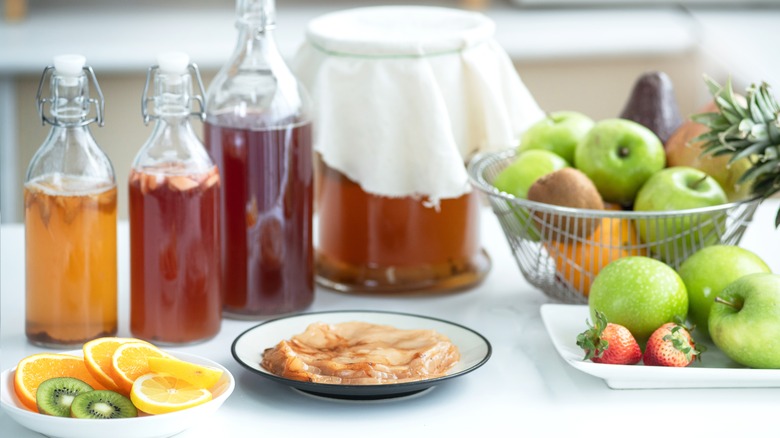How Long You Can Safely Drink Kombucha After Opening
Kombucha is sweet, fizzy, and has more zing than your typical tea. You can probably find more than a few bottles of it in the refrigerated section of your local grocery store, as this fermented drink has exploded in popularity over the past several years. Then again, you might already have a bottle (or two) in your fridge at home. And you may be wondering how long that bottle will keep after opening it. After all, when it comes to bottled teas, the shelf life does shorten significantly after opening. But does this truth hold for kombucha?
Like other beverages, kombucha is best when consumed within a week after opening. However, kombucha doesn't necessarily go bad in the same way that, say, fruit juice does. Your kombucha won't be unsafe to drink if left on your refrigerator shelf for a week (or two, or three) after opening. Rather, it will lose its bright, bubbly nature, and might develop a sharper, acidic flavor. This is especially true if you don't store your drink properly. Leaving it on the counter or fermenting it for too long can cause your kombucha to take on an unpleasant taste. On the other hand, homemade kombucha can last in your fridge for up to three months while maintaining its bubbles and taste. But whether your fermented tea is homemade or store-bought, there are some definite signs of spoilage to look out for before you take a sip of your kombucha.
How to tell if your kombucha has turned
Alcohol keeps kombucha from spoiling; but kombucha's alcohol content is very low, usually less than 0.5%. This small bit of alcohol helps prevent the drink from spoiling by staving off potentially harmful microorganisms.
However, this doesn't mean that kombucha can't go bad. If you see any visible mold in your kombucha, that is a sign to toss the drink and buy a new bottle. Additionally, if your drink is too tart or tastes like vinegar, you should buy a new bottle. Changes in color or visible mold on the drink's surface are clear signs of spoilage. It's also important to honor the expiration date listed on your bottle, as this will ensure that you are getting the best-tasting drink possible.
You should also take care to store your kombucha properly. Even unopened, your kombucha should still be refrigerated. If left at room temperature, it will take on a sharp, unpleasant taste. Storing your kombucha in the fridge will extend its shelf life and its fizziness.
Some exceptions to kombucha's shelf life
Now that we've covered the basics of kombucha's shelf life, it's important to note the exceptions to this guidance. Home-brewed kombucha should be approached with a bit more caution when storing for extended periods. This is because home-brewed varieties are not required to follow the same production safety guidelines as commercially produced kombucha, which means your home-brewed kombucha might be more prone to outside contaminants such as mold.
Several key factors can cause homemade kombucha to go bad. Containers that are prone to scratches — such as glass or plastic, for example — can leave room for bacterial contamination, making your kombucha unsafe to drink. Some plastic containers can leech potentially toxic elements into your beverage.
Improper fermentation can also prove to be a risk for home brewers. For this reason, extra precautions should be taken before preparing your kombucha. However, if you're committed to the craft, you can benefit from a potentially extended kombucha shelf life by making it yourself. So, it might just be worth all of that brewhaha.


